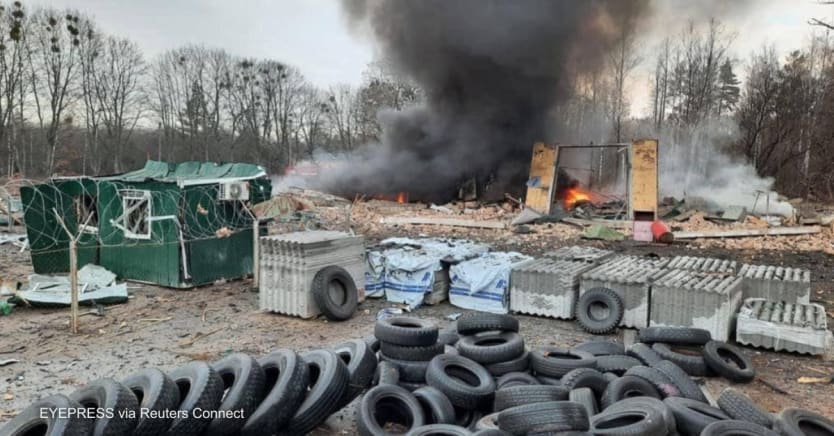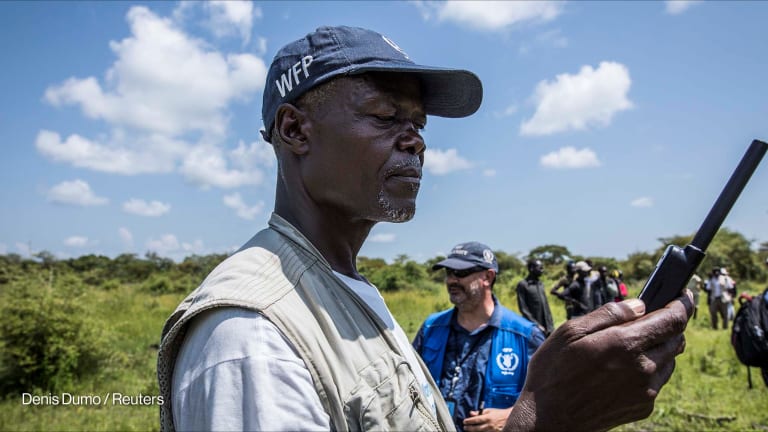
With Russian forces launching an invasion of Ukraine on Thursday, humanitarian organizations are scrambling to quickly adapt their operations both within the country and just across its borders as civilians flee the violence.
More on Ukraine:
► Nervous aid workers in Ukraine fear a humanitarian 'disaster'
While many international NGOs currently operate in Ukraine, the personnel are for the most part not humanitarian specialists; instead, they have tended to focus on longer-term economic development. This means that even organizations with a presence in the country will likely have to deploy new staffers, experts told Devex. Others, such as humanitarian group Mercy Corps, have no presence in Ukraine and are now assessing how they might help.
Western governments have largely condemned the invasion, with many European leaders proclaiming that their borders are open to Ukrainians.
British Prime Minister Boris Johnson told members of Parliament on Thursday that “the humanitarian impact threatens to be enormous.” In a joint statement, the G-7 group of nations said its members would support Ukrainian humanitarian needs. “We stand ready to support with humanitarian assistance in order to mitigate the suffering, including for refugees and displaced persons from the Russian aggression,” it said.
So far, key donor governments have announced no major aid packages. Meanwhile, groups such as the International Committee of the Red Cross and CARE have each launched humanitarian appeals, while the United Nations allocated $20 million in emergency funding.
Neither donor governments nor humanitarian agencies have released projections for the number of people expected to be displaced by the conflict. Migration experts say it is nearly impossible to make a prediction this early.
Displaced civilians have already been reported at Ukraine’s borders with Moldova, Slovakia, Romania, and Poland, while Ukrainian NGOs are bracing to support people who remain in the country.
“We’re evacuating our beloved and reformatting our work to react to the further challenges in [the] humanitarian sector. … We’re preparing for the worst case scenario as [an] NGO,” Ivan Paramonov, vice director at Shutka, a Ukrainian NGO, told Devex by WhatsApp from Kyiv. “We are not planning to surrender our homeland [or] … my beautiful hometown of Kyiv.”
He added that “We stand here and hope you’d stay with us.”
Coordination is emerging as a key challenge for NGOs, according to Mark McGreevy, the chief executive at Depaul International, a homelessness charity that is now preparing to dramatically broaden its humanitarian work.
“Internet, power is coming and going,” McGreevy told Devex of trying to communicate with his staff members in the country. “It’s really chaotic on the ground, as you can imagine.”
Depaul staffers in the northeastern city of Kharkiv, where there have been reports of heavy fighting, were ordered by police to move a feeding project inside a cathedral cellar because of the danger of explosives, he said. McGreevy said his staffers would continue their work if Russians entered the city.
“They are very tired and very worried, but they are OK,” he added.
Depaul’s Slovakia branch had been asked to provide 40 beds in the capital of Bratislava, McGreevy added. He said Depaul staffers reported seeing “massive” queues into Slovakia from Ukraine and an encampment on the border.
More than 4,000 people crossed from Ukraine into Moldova on Thursday, according to Moldovan President Maia Sandu.
The Swiss section of Médecins Sans Frontières confirmed it remains active in Ukraine and called for protection of medical facilities and access to health care for people in need. ICRC also said its teams were responding.
The U.S. Agency for International Development, for its part, announced it has deployed a disaster assistance response team, currently based in Poland, to lead the U.S. government’s humanitarian response and “identify priority needs” to help those displaced within and outside Ukraine’s borders.
Displacement figures ‘hard to predict’
Filippo Grandi, the U.N. high commissioner for refugees, said more than 100,000 people have been displaced within Ukraine, according to UN Refugee Agency spokesperson Matt Saltmarsh. In a statement, Grandi said his organization called on countries to keep borders open and said UNHCR has “stepped up our operations and capacity in Ukraine and neighbouring countries.”
But there has been little in the way of specific and official predictions for how many refugees and asylum-seekers could result from the invasion, given the continuing fluidity of the situation. Figures are likely being planned at the “country level,” according to William Chemaly, coordinator at the Global Protection Cluster, an international platform for organizations working on protection in humanitarian crises. He added that “any external indication of this could be interpreted as a political signal, so we stick to humanitarian planning.”
Because the violence is taking place on European soil, this displacement differs from migration crises on the continent in the recent past.
The state of humanitarian aid in Ukraine
Since 2014, $600 million of aid to Ukraine was mobilized through the humanitarian response plans. Devex looked at the 2021 data to see where the money is coming from.
Ukrainians can enter most neighboring countries without a visa, so many of the people who flee will not have any issue crossing borders, Kate Hooper, a policy analyst at the Migration Policy Institute, told Devex. This also means they are unlikely to seek protection through humanitarian channels because they are already eligible for work permits in other countries.
“It’s not really necessarily accurate to refer to this population as ‘refugees’ because many of these people may not end up applying for asylum,” Hooper said.
Hooper said she expects most people to first be internally displaced — adding to a population that already numbered 700,000 due to simmering violence from Russia’s 2014 incursion into Ukraine. But “it’s difficult to tell the extent to which people will move internally within Ukraine versus seeking sanctuary in another neighboring country,” she added.
“It’s just very hard to predict,” Hooper said.
An NGO staffer whose organization is operating with partners in Ukraine told Devex that “we are seeing the worst-case scenario play out here.”
The staffer, who was not authorized to speak to the press about ongoing operational preparations, added, “Between all the NGOs, I expect that within the next 24 hours we will have a full humanitarian response up and running,” including inside Ukraine and in neighboring countries.
There is a distinction between aid work inside Ukraine — which will depend more on the conflict and shifting front lines — and work at the borders to help the people pouring into Poland and other neighboring countries, the staffer said.
Humanitarian response
Some humanitarian organizations are being cautious with their public comments, fearing potential harm to their operations inside Ukraine. Russia has a history of blocking humanitarian access to Western aid groups during conflict.
Mercy Corps does not currently operate in Ukraine but is sending a small team on a scoping mission to assess needs inside the country. The team will gather in Poland and enter Ukraine as security permits, and it will then determine whether the organization should begin operating there.
“The key for us, really, is: What’s the added value? We understand there is quite a number of humanitarian actors still in the country, so [we are] really trying to think about what would Mercy Corps’ added value be if we go in,” Michael McKean, the head of Mercy Corps Europe, told Devex.
The scale of a potential response will also depend on donors stepping up, McKean said, noting that Mercy Corps operated in Ukraine following the 2014 conflict but left in 2017 in part due to a lack of funds.
“We are seeing the worst-case scenario play out here.”
— An NGO staffer whose organization is operating with partners in Ukraine“There is relatively little humanitarian funding,” Lyubov Margolina, program development manager at the East Europe Foundation, a Kyiv-based NGO, told Devex. “We had a huge humanitarian problem in 2014 and in the first years after the conflict, but the individuals who were affected have moved and integrated into new communities. They have found new homes. Most of the funding is now development funding for causes such as economic development.”
As a result, humanitarian organizations are not operating widely. Only a little more than 10% of all bilateral funding to Ukraine in recent years has gone to humanitarian issues.
The latest of the U.N. humanitarian response plans for Ukraine — which have been issued since 2014 — was “only 9% funded for this year,” Chemaly said. “This limits agencies' capacities to be prepared. No doubt resources [will] come, but a starting point would have been better with more resources in place.”
The humanitarian response plan called for $190 million to be donated this year. That figure is now likely to dramatically increase, and donations are being ramped up rapidly. More money has been committed to the country in the past 24 hours than in the rest of the year put together, with the current figure standing at $52.9 million.
So far, NGOs have been divided about whether to launch their own appeals for public donations. In the U.K., the Disasters Emergency Committee, a coordinating body for large-scale humanitarian response, said its criteria for an emergency appeal had not yet been met. However, the British Red Cross has launched an appeal.
A senior source at the U.K. Foreign, Commonwealth & Development Office told Devex that humanitarian contingency planning regarding Ukraine had been ongoing for some weeks. But a senior member of Parliament said U.K. ministers had not given clear answers in private conversations Thursday about how the government would deliver aid.











